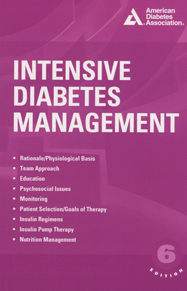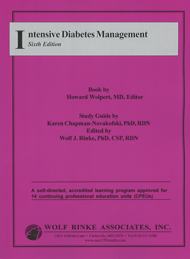| Intensive Diabetes Management, Sixth Edition
| C300 |
14 CPEUs |
HARD COPY |
Currently out of stock.
New inventory coming soon. |
|
For health care practitioners who want to implement this highly effective team approach to help patients improve glycemic control and overall health. Will enable you to:
- Apply various principles of insulin to the client’s individualized needs;
- Analyze carbohydrate intake, glucose responses, and insulin injections to propose reformulated plans to achieve blood glucose goals;
- Implement monitoring and treatment plans for managing hypo-and hyperglycemia;
- Apply self-monitoring of blood glucose (SMBG) and ketone monitoring to client management cases;
- Plus much, much more.
Share with a friend and Save! Click here for important information about
sharing.
To order an ADDITIONAL Reporting Form click below:
| C300F |
14 CPEUs |
REPORTING FORM |
Currently out of stock.
New inventory coming soon. |
|
Intensive Diabetes Management, Sixth Edition
© 2024 Wolf Rinke Associates. All rights reserved for this self-directed accredited learning activity. Reproduction in whole or part without written permission, except for brief excerpts, is prohibited.
LEARNING OBJECTIVES
Upon completion of this CPE activity you will be better able to:
- Recommend intensive diabetes management based on client characteristics;
- Align a client’s readiness to learn/change with an appropritate stage in education for blood glucose management;
- Reflect the client’s history and personal characteristics when evaluating the sequencing of diabetes management;
- Apply knowledge of motivation and support required for successful implementation of intensive glucose management;
- Discuss anxiety issues common in diabetes management with client and propose strategies to alleviate these anxieties;
- Propose practical strategies to engage the client in lifestyle behavior changes;
- Integrate the factors to consider when establishing individualized goals into a treatment and client support plan;
- Apply principles of insulin absorption and availability to client care;
- Apply the principles of insulin peak action and duration to client care;
- Discuss the stability and storage of insulin;
- Apply the principles of basal and bolus insulin to the client’s individualized needs;
- Formulate the total daily insulin dosages needed;
- Analyze carbohydrate intake, glucose responses, and insulin injections to propose reformulated plans to achieve blood glucose goals;
- Discuss the principles and technical capacity of insulin pumps;
- Formulate insulin dosages needed for pump therapy;
- Apply insulin sensitivity factors when calculating insulin dosage needs;
- Integrate the insulin-to-carbohydrate ratios into client care;
- Apply the impact of exercise on blood glucose and insulin regimens to client management;
- Discuss methods to reduce risk of infection at the insulin pump site;
- Identify symptoms of pump malfunction and develop strategies to address these issues;
- Implement monitoring and treatment plans for managing hypo-and hyperglycemia;
- Apply self-monitoring of blood glucose (SMBG) and ketone monitoring to client management cases;
- Discuss the target nutrition recommendations for people with diabetes and apply to case management;
- Integrate intensive diabetes management techniques for people with type 1 or type 2 diabetes;
- Recommend meal planning approaches for individuals with diabetes using intensive diabetes management;
- Discuss the role of body weight and appropriate weight goals for reaching glycemic goals.
ABOUT THE AUTHOR OF THE STUDY GUIDE
Karen Chapman-Novakofski, PhD, RDN is a Professor in the Department of Food Science and Human Nutrition at the University of Illinois. She is an internationally recognized expert in the area of nutrition education, and has specifically addressed issues related to the older adult, including osteoporosis and diabetes. She has authored more than 200 publications, and is a recognized speaker nationally and internationally.
She has received many awards for her teaching, research and outreach, including the prestigious Excellence in Nutrition Education award from the American Society for Nutrition; the Mary Abbott Hess Award for Innovation in Education for the Your Guide to Diet and Diabetes website from the Academy for Nutrition and Dietetics Foundation; and the Outstanding Research Paper Award from the American Dietetic Association Diabetes Care and Education Practice Group.
Karen has served as Expert reviewer for Academy of Nutrition and Dietetics, Diabetes Types 1 and 2 Evidence-Based Nutrition Practice Guidelines; served on the National Community of Practice, eXtension, Diabetes online community core working group; and was appointed to the Illinois Diabetes Commission by the Secretary of the Illinois Department of Health and Human Services. Prior to her academic career, Dr. Chapman-Novakofski was a research and nutrition support dietitian for a veterans’ medical center for 12 years.
If you prefer to order by phone, mail
or fax click below
or click here to contact us with
other questions.
For information about our other products and
services return to the sidebar at the top of the page.
|


